18 Feb 2014 | Europe and Central Asia, News, Russia
Homosexuality and LGBT rights have made headlines across the globe during the Sochi Winter Olympics, following Russia’s introduction this summer of laws banning “gay propaganda”.
Index invited Brian Pellot, Director of Global Strategy and Religious Freedom Editor at Religion News Service, and Joel Bedos, International Coordinator for International Day Against Homophobia (IDAHO), to join us for our first ever Drawing the Line Google Hangout, to debate young people’s views on same-sex relationships.
Watch the discussion below and have your say in the comments, or get in touch on Twitter @IndexCensorship using the hashtag #LoveandFEX
This article was published on 18 February 2014 at indexoncensorship.org
7 Feb 2014 | Europe and Central Asia, News, Russia
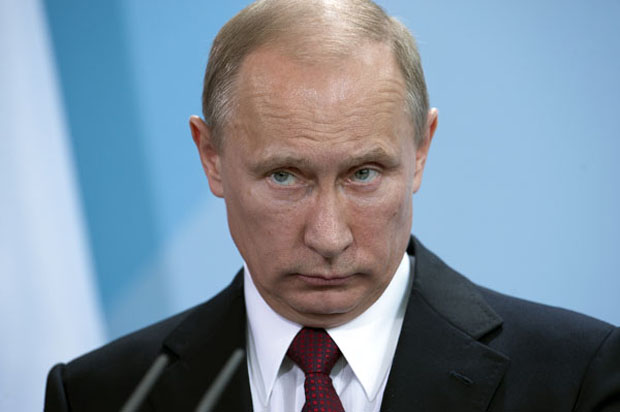
(Image: Gonçalo Silva/Demotix)
The Sochi Winter Olympics opening ceremony is taking place today, and organisers have declared that a record 65 world leaders are attending. But numbers alone don’t tell the whole story. As it turns out, some of the biggest names in global politics will not be in the stands cheer on their athletes as the games are officially kick off. Indeed, quite a few won’t be taking the trip to Sochi at all. Barack Obama is sending a delegation including openly gay figure skater Brian Boitano in his place, and Angela Merkel, David Cameron and Francois Hollande are also staying away.
But while the International Olympic Committee’s Thomas Bach was less than impressed by the apparent boycott, labelling it an “ostentatious gesture” that “costs nothing but makes international headlines”, the absence of the big guns does give the lesser-known world leaders a chance to shine. Not all guests have been confirmed, but we’ve got the low-down on some of the the leaders the cameras might pan to during today’s festivities, or who could be spotted in the slopes over the coming weeks.
Alexander Lukashenko
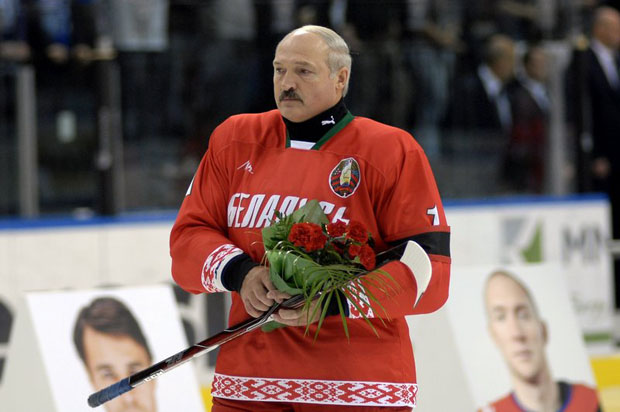
(Image: Ivan Uralsky/Demotix)
Putin’s long time colleague and fellow ice hockey enthusiast surely wouldn’t miss the Winter Olympics for the world. The Belarusian president is known as “the last dictator in Europe”, his near 20 years in power having passed without a single free and fair election. Under his leadership, peaceful protests have been violently dispersed, and civil society activists and political opposition — including rival candidates from the 2010 presidential elections — have been jailed. A brand new report from Index also concludes that: “Belarus continues to have one of the most restrictive and hostile media environments in Europe.”
Recep Tayyip Erdoğan

(Image: Philip Janek / Demotix)
The Turkish president made global headlines last summer, over his regime’s violent crackdown on the peaceful Gezi park demonstrations. Rather than accepting the protests were a manifestation of genuine grievances by his people, he blamed “foreign hands” and their “domestic collaborators” like many a less-than-democratic leader before him. His government was recently implicated in a big corruption scandal, and only yesterday, parliament approved controversial amendments to the country’s internet law. The new law, opposed by civil society, the opposition and international organisations alike, gives the government wide-reaching powers over the internet, effectively allowing them to block websites without court rulings, and gives them access to user data.
Viktor Yanukovych
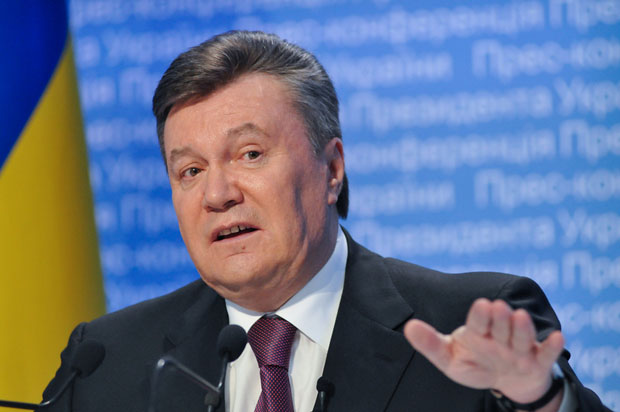
(Image: Oleksandr Nazarov/Demotix)
The Ukrainian president’s failure to sign a treaty securing closer ties with the EU in November, sparked the country’s ongoing Euromaidan protests. The authorities response was heavy handed — police clashed with demonstrators and journalist were targeted, leading to international condemnation. They authorities even briefly implemented a highly repressive new law, among other things allowing security services to monitor the internet, and defining NGOs receiving funding from abroad as “foreign agents”. The law was, however, scrapped only days later following outrage from civil society. Meanwhile,Ukraine’s Prime Minister and government also stepped down, while Yanukovych took four days off ill. He’s back in the office now — just in time head to Sochi for a much-hyped meeting with Putin.
Nursultan Nazarbayev
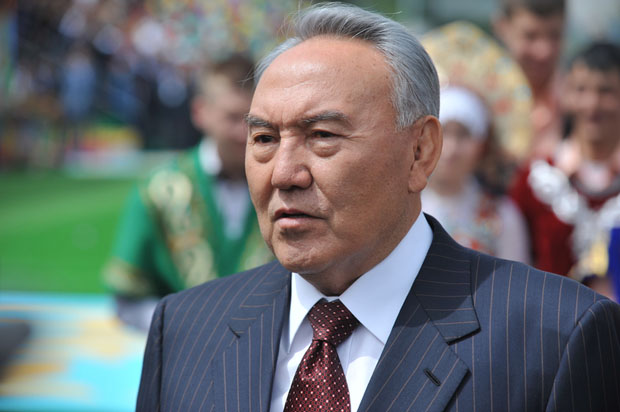
(Image: Vladimir Tretyakov/Demotix)
Kazakhstan’s president has been in power since 1991, and during that time, allegations of human rights abuses, including attacks on demonstrators and independent media, as well as widespread corruption have been regularly levelled at him. In 2012, following clashed between the police and striking workers, the president, who already effectively controls the legislature and the judiciary, further extended his emergency powers. But Putin wouldn’t even be his only high-flying friend. In September, Kanye West performed at his grandson’s wedding. The reported price tag? $3 million. Did I mention the accusations of corruption? Meanwhile, former British prime minister Tony Blair spent two years advising Nazarbayev and his government on democracy and good governance — a deal which “produced no change for the better or advance of democratic rights in the authoritarian nation”.
Emomali Rahmon
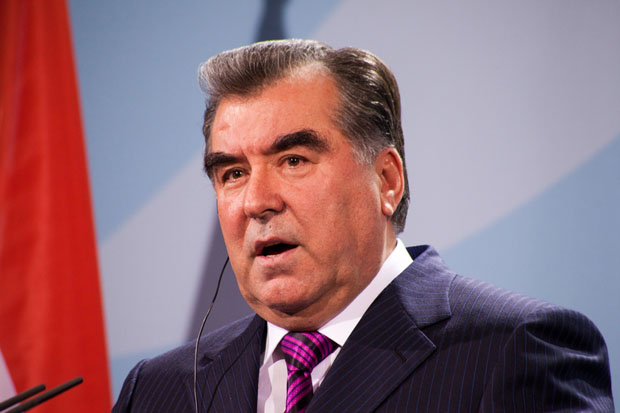
(Image: Riccardo Valsecchi/Demotix)
He has been the head of the government of Tajikistan since 1992, and was in power during the country’s civil war, where 100,000 people lost their lives. Allegations of human rights abuses, including torture by security forces and arbitrary arrests, are widespread. Much of the media is state-controlled, and independent journalists face violence and intimidation. “Publicly insulting the president” can see you jailed for as long as five years. Recently, a prominent member of the opposition, Zaid Saidov, was sentenced to 26 years in prison following what has been described as a “politically motivated trial”. In Sochi, he is set to meet with not only Putin, but also Chinese leader Xi Jinping.
This article was posted on February 7 2014 at indexoncensorship.org
6 Feb 2014 | News, Religion and Culture, Russia
Human Rights Watch released a video documenting the treatment of LGBT Russians on 3 February ahead of the opening of the Sochi Winter Olympics.
Drawing a screen around the realities of life for Russian gays and lesbians, Russian president Vladimir Putin and the organizers of the Sochi Winter Olympic games are presenting a decidedly friendly face to international visitors.
Even though Sochi’s mayor, Anatoly Pakhomov, would prefer to believe “there are no gays” in his city, the mayor of the Olympic village, Elena Isinbayeva, offered to make LGBT athletes to feel welcome — despite her earlier homophobic comments. The girl band Tatu, most popular during the early 2000s when they exploited homoeroticism in their live appearances and videos, will perform at the opening ceremonies.
The real Russia has turned ugly and brutish toward its LGBT citizens.
The recent spate of homophobic violence has its roots in a controversial law that bars the promotion of non-traditional relationships as being equal to traditional relationships. While the law’s backers say they are protecting children, the effect has been to silence the push for gay rights by threatening fines for “homosexual propaganda.”
While official Russia will be demonstrating what it sees as tolerance in Sochi, a court in the city of Nizhniy Tagil will issue a ruling on the case of Elena Klimova – a young journalist who created a group on Vkontakte – Russia’s answer to Facebook. Klimova’s group, Children 404, contains letters from young LGBT people, who have been subject to physical and psychological attacks. Their letters to each other, according to Klimova, have been helping them cope with the pressure and continuing struggle for their rights. Klimova’s efforts to ease the isolation of LGBT children has drawn the ire of United Russia’s Vitaly Milonov, a proponent of the gay propaganda law, who has sued Madonna and been exposed as a bigot by Stephen Fry.
Klimova has also been active in raising concerns about the plight of a teen girl in the Bryansk region who has been put under administrative control by a local juvenile commission. Her crime? The girl openly identified “herself as a person with non-traditional sexual orientation and promote[d] information which misinforms minors about social equality of traditional and non-traditional relationship”. She will be monitored as if she were a criminal.
According to the latest Levada-Centre research, some 43% of Russian citizens consider homosexuality a bad habit, 38% reckon LGBT people should be “cured”, 47% say LGBT and heterosexuals are not socially equal and 73% approve the state’s effort to prevent public professions of an LGBT orientation.
The Russian Orthodox Church has done a lot to maintain these numbers.
Patriarch Kirill has repeatedly condemned equal marriage, saying in late January that marriage is “between a man and a woman, based on love, aimed at having children”. Kirill asked law makers to reflect his belief in drafting laws. Moscow Patriarchate’s spokesman Vladimir Legoida called equal marriage and homosexuality a sin in an interview to RIA-Novosti – the former Russian state news agency. Not to be outdone, Ivan Okhlobystin, an actor and former priest, said “gays should be burnt in ovens”.
In the meantime, on 3 February, the regional court of Kamchatka sentenced three people to 9-12 years in prison for the murder of a gay acquaintance.
Homosexuality was decriminalized in Russia in 1993. In 1999 it finally was excluded from Russian official list of mental illnesses. The change in people’s mind is still yet to come.
This article was originally published on 6 February 2014 at indexoncensorship.org
5 Feb 2014 | News, Russia
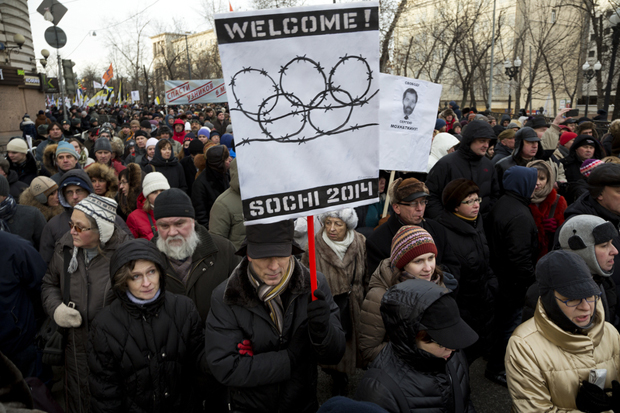
Several thousand protesters marched through central Moscow on 2 February 2014 to call for the release of 20 people who were arrested after clashes between police and demonstrators on 6th May of 2012. Photo: Nickolay Vinokurov / Demotix
Media will face increased restrictions in the build up to the Winter Games in Sochi as Russian president Vladimir Putin tries to rehabilitate a damaged domestic reputation, experts suggest.
Tighter controls on dissident media, more proactive use of state news outlets to mold public consensus, and obstacles to foreign reporters operating in the region can all be expected as the games begin on 7 February.
While Russian authorities have hailed the Games as a triumph, ongoing disputes over the payment of migrant workers, the environmental impact of Sochi’s intensive development, forced evictions of residents, intensive security measures, and Russia’s controversial gay propaganda law have all generated a domestic backlash that many believe is being deliberately ignored by state media. On 17 October, 2013, Roman Kuznetsov, a migrant worker from the Russian city of Orenburg who had helped build the Media Centre for the Sochi Olympic Games, sewed his lips shut with a needle and thread in protest against his employer’s failure to pay him several months of wages. He carried a sign that explained “Please help get reporters attention! I am not from around here”.
In an interview with select global media, Putin explained “I would like the participants, guests, journalists and all those who watch the Games on TV and learn about them from the mass media to see a new Russia, see its personality and its possibilities, take a fresh and unbiased look at the country”. Close restrictions recently imposed on press activity suggest otherwise. Only a small number of Olympic Events have been cleared for coverage by local journalists, including the arrival of IOC delegations and formal updates offered by federal officials. Access to government activities is granted only to the All-Russia State Television and Radio Broadcasting Company.
In a report produced by the Centre for the Protection of Journalists, a number of local journalists allege a more proactive media strategy in addition to direct censorship. Several reporters suggested that it was fairly common for media that receive funding to be directly censored by the administration. Local journalists also reported that the All-Russia State Television and Radio Broadcasting Company often stage interviews, and had been passing off closely scripted lines as dialogue with ordinary residents of Sochi. According to Russian Government website Zakupki, which details financial transactions at all levels of Russian government, the Sochi administration has distributed some 32,628.600 rubles (US$988,788) to 17 media organisations, including four television channels, six newspapers, one magazine, three radio stations, and one informational agency. It is not clear what form the funds took.
Aleksandr Valov, founder of BlogSochi, which seeks to document the impact of the Games on Sochi’s residents, explains “One begins to understand why Sochi media only talk about the government’s achievements and keep silent about the problems. The popular saying ‘He who pays the piper calls the tune’ comes to mind.”
International journalists covering Sochi have also been closely curtailed. Police from the Russian Republic of Adygea neighboring Sochi repeatedly stopped, detained, and threatened a two-person crew from Norway’s TV2- the country’s official broadcaster of the Olympic Games. At every stop and in detention, officials questioned the journalists aggressively about their work plans in Sochi and other areas, their sources, and in some cases about their personal lives, educational backgrounds, and religious beliefs. In several instances they denied the journalists contact with the Norwegian Embassy in Moscow. One official threatened to jail them both, the journalists told Human Rights Watch. Dutch photojournalist Rob Hornstra was denied a Russian visa in an apparent attempt to stop him from doing further work in the turbulent North Caucasus, and American journalist David Satter was forcibly expelled from the country in December.
Since beginning his first term as president in 2000, Vladimir Putin has carefully controlled his media presence, closing a number of independent media outlets and amalgamating others with state bodies, whilst tightly controlling the presence of foreign media. Professor Owen Johnson teaches at the School of Journalism at Indiana University, and has researched the role of media in Russia intensively. He offers a simple explanation for the recent expulsions ‘”While it would seem that this runs counter to other more positive actions by President Putin recently, this might be designed to make visiting journalists more cautious,” Johnson said. “Putin is less concerned about world public opinion than he is about his continued support in Russia.”
Domestic attitudes to Putin are changing fast, according to Mikhail Dmitriev, former director of Russia’s State Run Centre for Strategic Research. Over the past year discontent in the country at large has deepened and broadened, spreading across all social groups and ages. While support for Putin is stable in St. Petersburg and Moscow, where incomes remain high, fluctuating fortunes in Russia’s rural regions is starting to generate distrust. Dmitriev said the latest focus groups show that Putin is less associated with stability and more with uncertainty. His past achievements are becoming a distant memory, and his recent stunts, such as flying with cranes or diving for ancient amphorae, merely cause irritation.
The Sochi Games, Putin explained in a conference with journalists, will be an important global symbol of Russian achievement and resurgence. For Putin, well-managed domestic media coverage seems an important strategic component of his long term success and survival.
This article was originally posted on 5 February 2014 at indexoncensorship.org







